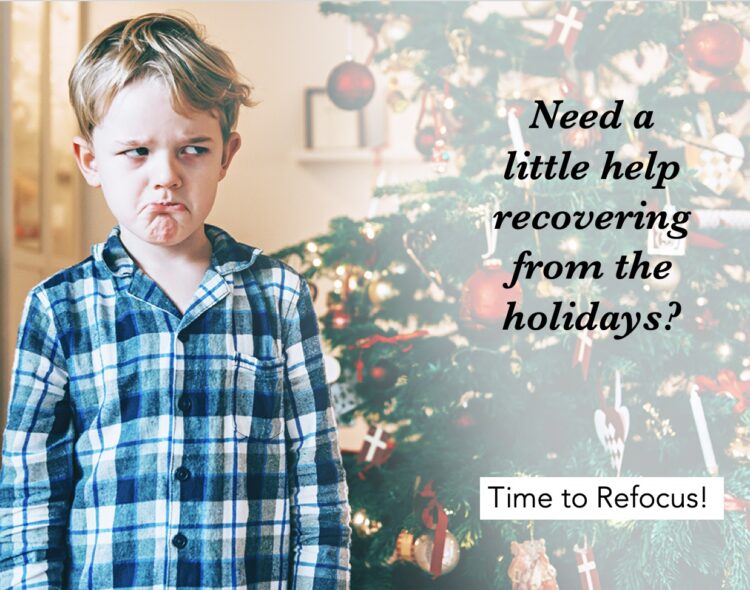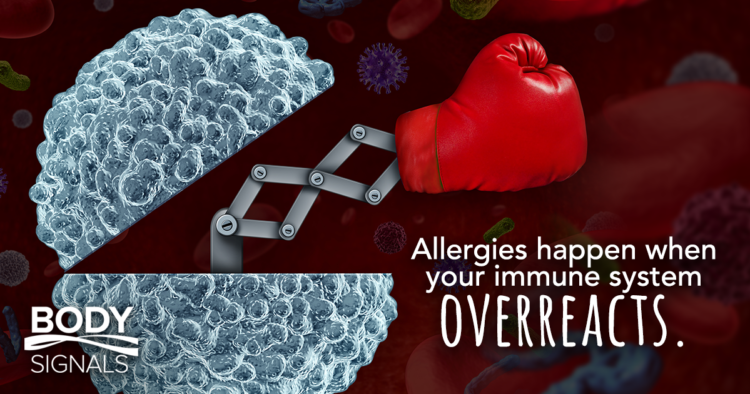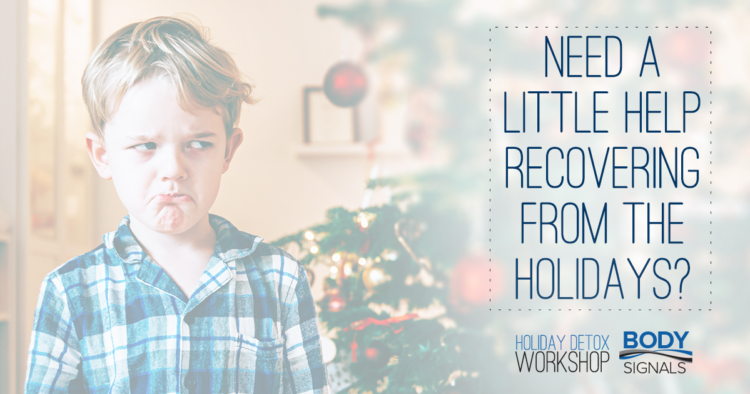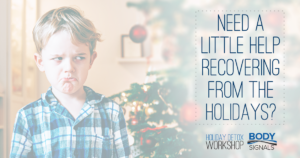Oops you did it again. Way too much food, drink and don’t forget the crazy stress, travel, family drama, and maybe just one too many fruitcakes can all contribute to the dreaded holiday hangover.
The truth of the matter is that the STRESS of the holiday season is nothing to dismiss. It is the time of year when heart attacks reach a peak level. For 46% of people, their first sign of heart disease is a fatal heart attack.
For others – the holidays bring cold/flu, exhaustion, poor digestion, sleep disturbances, irritability, and depression, and
anxiety.
Symptoms are signals that our body tells us to let us know that something is wrong or that our body is trying to adapt to something. Body signals are the tip of the iceberg because they only represent the point at which our brains become aware that a problem is happening or has been happening for a while. Learning how to “speak body” is critical to our health outcomes.
The way in which we think about our symptoms drives our choices and it’s our choices drive our outcomes.
Sources of Stress
Stress around the holiday season can bring on a multitude of body signals. Stress can most definitely come in the form of excessive food and alcohol intake, or sweet and calorie-rich foods.
There may also be stress from late nights, long travel days, high states of family distress and emotional turmoil, poor sleep in different beds and let’s not forget the financial stress that the holidays can bring on with over-spending.
We can even have physical stress from long drives, poor bed arrangements, or sitting too much – all of these stresses add up. When they exceed your body’s ability to adapt, the body begins to let you know that there is a problem.
Voila! The body signals begin and we manifest them as symptoms and thus you may experience the Holiday Hangover.
If we aren’t careful and manage our stress, we can start the year off on the wrong foot. We don’t want to drug away our symptoms because, well, that only masks the problem and doesn’t solve anything.
So let’s end the Holiday Hangover and get back on track!
With the New Year comes a renewed sense of a fresh start.
“I’m gonna lose weight this year!”
“I’m gonna quit smoking!”
I’m gonna be nicer to people!”
If you made a New Year’s resolution (and even if you refuse to make one each year) and have quit already, then listen up! Most people have fizzled out by week three in January.
EAT FOR RECOVERY:
How we eat plays a huge role in our weight and our energy levels. When you have a low energy level, it’s difficult to get the motivation to stay active and exercise. However, when you give your body the proper nutrition, you can have more energy, lose more weight, and stay more active.
Here are MUST-DO’s:
- Never Go Hungry – eat lots of smaller portions and meals. Starving yourself doesn’t work
- The Battle is Won at the Register – if you don’t buy the bad foods, you won’t eat them
- Don’t Drink Your Calories
- Avoid the White Stuff (bread, pasta, white flour etc)
- No Refined Carbohydrates and Sugar
- Fill Yourself With Healthy Foods*
*Instead of focusing on the foods, you shouldn’t eat, let’s highlight a few foods and supplements that can help you stay active, energize, and get ready to shed those pounds.
Subtraction by Addition
Eating well is critical to getting rid of the holiday hangover. Here are a few high energy foods (without that sugar crash): blueberries, strawberries, salmon, lean meats, nuts, whole grains, vegetables.
Supplements such as fish oil and probiotics can help you reduce inflammation and keep your gut healthy and happy.
Focus on having protein at every meal.
Stop mixing fats and carbs or protein and carbs. Fats and proteins. Carbs on their own.
Eat a handful of nuts once a day. Raw is best.
Some other tips:
- Unlimited Vegetables
- Plenty of Lean Cuts of Natural Meats, Fish, and Eggs
- Some Fruit, Nuts, and Seeds
For healthy foods to give you an energy boost, it’s all about eating the right ones at the right time. Eating small meals and snacking throughout the day is a great way to keep your body fueled and your energy levels high.
Start by eating a few small meals per day and snacking every few hours in-between. This will help keep your energy up throughout the day. You’ll feel better, think better, and be more motivated to stick with your exercise routine.
Slow it Down
“IT’ is your brain. Your nervous system takes on all of the stress. Since we live our lives through our nervous systems, we experience all of our stress through it. We want to calm it down after the holidays.
Exercise is a great way to burn off steam. Take a walk. Hit the gym. Do a yoga class. Punch a heavy bag. Whatever you want. If you’ve been sitting for the majority of the holidays, then its time to get active. Pick something that you enjoy doing and get to it.
Another fantastic way to calm your nervous system is simply through breathing.
Try this out!
While laying on your back in bed, place both your hands on your heart. In this position take ten deep breaths in through the nose and out through the mouth. You want to feel your breaths lifting and dropping your hands up as your chest rises and falls. After ten, move your hands to the top of your abdomen but below your ribcage. Take ten more breaths here. Finally, move your hands to your lower abdomen over your belly button. Perform another ten breaths. Then move your hands back to your upper abdomen for another ten breaths and finally back to your heart for the final ten.
Ahhhhhhhhh!
This is a great exercise for when you are having trouble sleeping. The key is to concentrate solely on the rise and fall of your breaths and the action of taking the breath in through your nose and out through your mouth.
Nobody likes a hangover. They are terrible.
But….
The New Year is a great time to improve your health, get a little extra motivation and even lose a few pounds in the process! Now it’s time to recover.




 Dr. Craig Hazel’s mission is to help families THRIVE. After graduating from Queen’s University with a Bachelor of Science and a Bachelor of Physical and Health Education, he went on to earn a Doctor of Chiropractic degree and a Bachelor of Science in Anatomy from Parker College of Chiropractic in Dallas Texas. He is passionate about seeing children and families in his private practice at Synergy Chiropractic in Kanata Ontario. A sought after speaker, he has been featured regularly on TSN Team 1200, CTV and Rogers TV. He is also the Chairman of the Alliance for Chiropractic of Ontario.
Dr. Craig Hazel’s mission is to help families THRIVE. After graduating from Queen’s University with a Bachelor of Science and a Bachelor of Physical and Health Education, he went on to earn a Doctor of Chiropractic degree and a Bachelor of Science in Anatomy from Parker College of Chiropractic in Dallas Texas. He is passionate about seeing children and families in his private practice at Synergy Chiropractic in Kanata Ontario. A sought after speaker, he has been featured regularly on TSN Team 1200, CTV and Rogers TV. He is also the Chairman of the Alliance for Chiropractic of Ontario.




